
Effective Practices for Academic Leaders, Volume 2 Issue 12 : Department Chairs and Servant Leadership Paperback / softback
by Daniel W. Wheeler
Part of the Effective Practices for Academic Leaders Archive series
Paperback / softback
- Information
Description
This briefing is intended to increase the knowledge and understanding of department chairs and their supervisors of a current leadership philosophy and practice known as servant leadership.
It examines servant leadership in the context of the department and the chair's functions. In 1970, Robert Greenleaf first described servant leadership.
He viewed servant leadership as a deep desire to serve-a prerequisite to leadership- and identified 10 characteristics of servant leaders.
Barbuto and Wheeler (2006) added an additional one: calling.
Subsequently, in a new model, Barbuto and Wheeler reduced these 11 characteristics to 5 and redefined them as the following factors: altruistic calling, emotional healing, persuasive mapping, wisdom, and organizational stewardship.
They also developed an empirical survey instrument for measuring these factors, the Servant Leadership Questionnaire (SLQ). In this briefing, I suggest that servant leadership is an appropriate practice for chairs because many of its outcomes (e.g., positive work environment, empowerment, and service) are those that chairs desire.
Research thus far suggests that servant leadership also results in greater commitment, satisfaction, effort, and trust.
I provide numerous examples of these outcomes in this briefing. This briefing also addresses a number of broad questions and issues about servant leadership: Is servant leadership too idealistic and "soft" to be effective?
Are decisions determined by the leader's ego needs? Can servant leadership be used to address all leadership and management functions?
Can one be a servant leader in a nonservant organization?
How does a servant leader deal with the paradoxes of chairing a department?
Can the chair meet followers' highest-priority needs?
Can't individual needs conflict with organizational needs?
Are the means as important as the ends? Why should chairs take the Servant Leadership Questionnaire (SLQ) as a development experience?
Information
-
Unavailable
- Format:Paperback / softback
- Pages:16 pages
- Publisher:Stylus Publishing
- Publication Date:15/12/2007
- Category:
- ISBN:9781579221744
Information
-
Unavailable
- Format:Paperback / softback
- Pages:16 pages
- Publisher:Stylus Publishing
- Publication Date:15/12/2007
- Category:
- ISBN:9781579221744